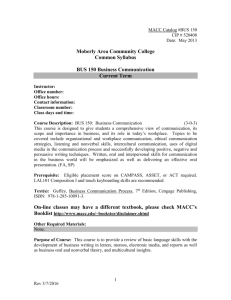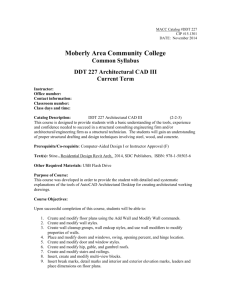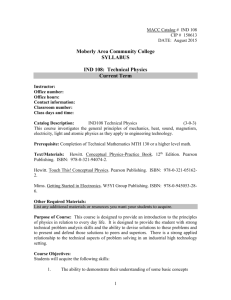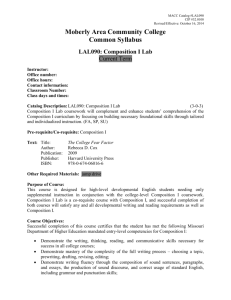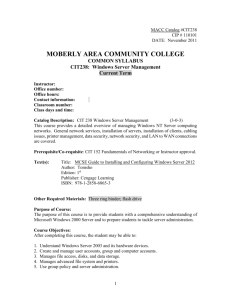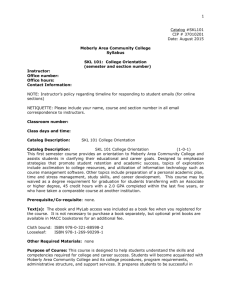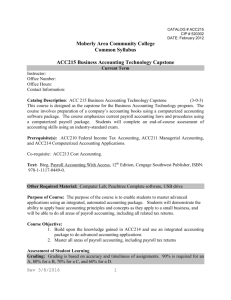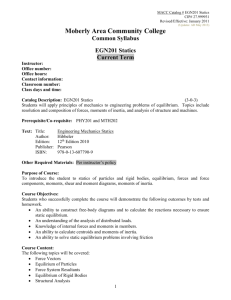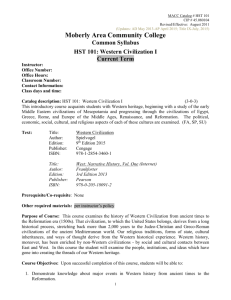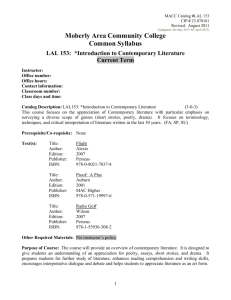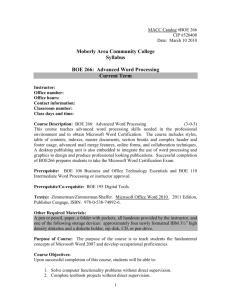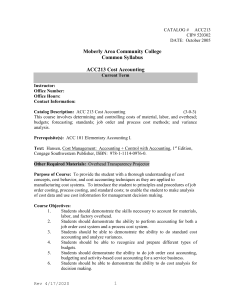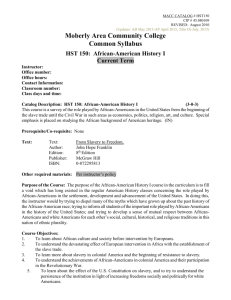EET 101 Industrial Electricity - Moberly Area Community College
advertisement
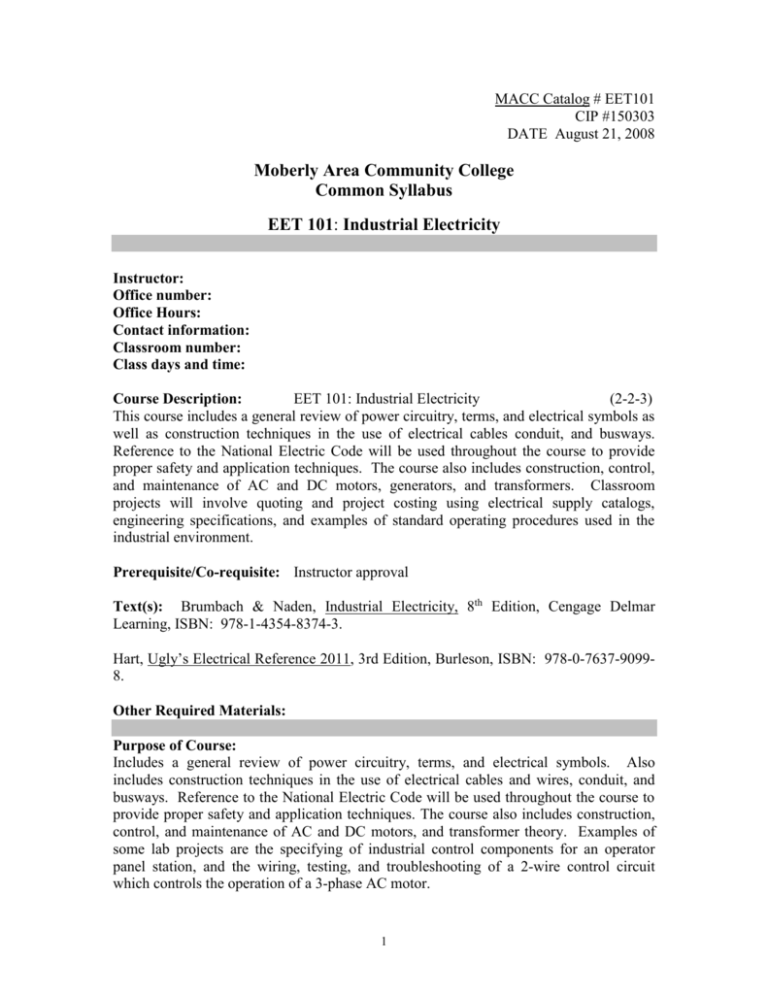
MACC Catalog # EET101 CIP #150303 DATE August 21, 2008 Moberly Area Community College Common Syllabus EET 101: Industrial Electricity Instructor: Office number: Office Hours: Contact information: Classroom number: Class days and time: Course Description: EET 101: Industrial Electricity (2-2-3) This course includes a general review of power circuitry, terms, and electrical symbols as well as construction techniques in the use of electrical cables conduit, and busways. Reference to the National Electric Code will be used throughout the course to provide proper safety and application techniques. The course also includes construction, control, and maintenance of AC and DC motors, generators, and transformers. Classroom projects will involve quoting and project costing using electrical supply catalogs, engineering specifications, and examples of standard operating procedures used in the industrial environment. Prerequisite/Co-requisite: Instructor approval Text(s): Brumbach & Naden, Industrial Electricity, 8th Edition, Cengage Delmar Learning, ISBN: 978-1-4354-8374-3. Hart, Ugly’s Electrical Reference 2011, 3rd Edition, Burleson, ISBN: 978-0-7637-90998. Other Required Materials: Purpose of Course: Includes a general review of power circuitry, terms, and electrical symbols. Also includes construction techniques in the use of electrical cables and wires, conduit, and busways. Reference to the National Electric Code will be used throughout the course to provide proper safety and application techniques. The course also includes construction, control, and maintenance of AC and DC motors, and transformer theory. Examples of some lab projects are the specifying of industrial control components for an operator panel station, and the wiring, testing, and troubleshooting of a 2-wire control circuit which controls the operation of a 3-phase AC motor. 1 Course Objectives: Knowledge and skill objectives will be achieved via lecture presentation, class discussion, homework, and evaluated by paper/pencil testing consisting of quizzes, midterm, and final exam. Practical skill objectives will be accomplished through the use of lab assignments utilizing electrical/electronic components, and equipment. Upon completion of this course, students should be able to: Demonstrate fundamental procedures for industrial electrical applications, in preparation as an Industrial Maintenance Technician. Course Content: 1. Language of electricity. 2. Electrical measuring/test instruments. 3. Conductor types and sizes. 4. Wiring methods. 5. Wiring applications. 6. DC motors. 7. Alternating current. 8. Transformers. 9. Electrical distribution. 10. AC motors. Statement to Connect Course with Technical Program Outcome Statement: In compliance with MACC’s General Education outcomes, the student who successfully completes this course will be able to: I. Demonstrate effective written and oral communication; Assessment of Student Learning: The EET faculty continually strives to meet the needs of their students through program improvements. These improvements are a result of program assessments and the consultation and advisement of the EET Advisory Committee. In addition to the course assessments outlined in this syllabus, the objectives achieved in this course will also be an integral part of the EET program assessment. Students will be assessed on the mastery of course concepts and essential skills attained in this course. 10% = Class Participation 20% = Homework/Quizzes 20% = Lab Assignments 25% = Mid-Term Exam 25% = Final Exam A = 90.0 - 100.0% B = 80.0 - 89.9% C = 70.0 - 79.9% D = 60.0 - 69.9% 2 F = 59.9% and below The instructor reserves the right to use/not use the curve grading system. Instructor Policies: Academic Dishonesty: MACC board policy is as follows: “Academic dishonesty by students damages institutional credibility and unfairly jeopardizes honest students; therefore, it will not be tolerated in any form.” Forms of academic dishonesty include but are not limited to the following: violations of copyright law, plagiarism, fabrication, cheating, collusion, and other academic misconduct. Incidents of dishonesty regarding assignments, examinations, classroom/laboratory activities, and/or the submission of misleading or false information to the College will be treated seriously. The procedure for handling academic dishonesty is outlined in the Student Handbook (Policy Handbook M.010). In cases of alleged academic dishonesty, the burden of proof is on the student, not on the instructor. Attendance: Any student who misses two consecutive weeks of class during a regular sixteen-week semester or the equivalent proportion of class time during a shorter session will be dropped from the class by the instructor unless acceptable justification is supplied. Additionally, any student who misses more than one-fourth of the entire number of in-seat class meetings in a regular 16-week semester or the equivalent proportion of class time during a shorter session, may be dropped from that class by the instructor if, in the opinion of the instructor, the student does not have reasonable opportunity to succeed in the class. A student’s attendance rate will be calculated based upon the first day of the semester (not the student’s date of enrollment in the course). Student attendance must be defined in a different manner for online, hybrid, and virtual courses. Student attendance in these courses is defined as active participation in the course. Online, hybrid, and virtual courses will, at a minimum, have weekly mechanisms for student participation, such as any or all of the following methods: a. Completion of quizzes or exams b. Submission of assignments c. Participation in threaded discussions d. Communication with the instructor A student who does not participate in an online, hybrid, or virtual course for two consecutive weeks will be dropped by the instructor unless acceptable justification is supplied. As with ground courses, a student’s attendance rate in online courses will also be calculated based upon the first day of the semester. If a student does not demonstrate active participation in the online course within the first two weeks (or the equivalent proportion of class time during a short session), the student will be dropped as “never attended.” Simply logging into an online class does not constitute active participation. Students should be aware that their dropping a course and their last date of attendance in the course may impact their financial aid. 3 Tardiness: All students are expected to be on time for class. Excessive tardiness will be dealt with on a one on one basis with the instructor. Make-up and late work: No makeup work or late work will be allowed except in “extreme” instances. Extra-credit work Extra credit may or may not be awarded. Schedule of Student Assignments/Activities: Instructors will identify a Student Assignment/Activities schedule. Instructors have the prerogative to construct the schedule by class periods, weeks, or an overview of topics to be covered. ADA Statement Students who have disabilities that qualify under the Americans with Disabilities Act may register for assistance through the Office of Access and ADA Services. Students are invited to contact the Access Office to confidentially discuss disability information, academic accommodations, appropriate documentation and procedures. For more information, please call either the Moberly office at (660) 263-4100 x 11240 or the Columbia office at (573) 234-1067 x 12120, or visit our web page at http://www.macc.edu/index.php/services/access-office. 4
